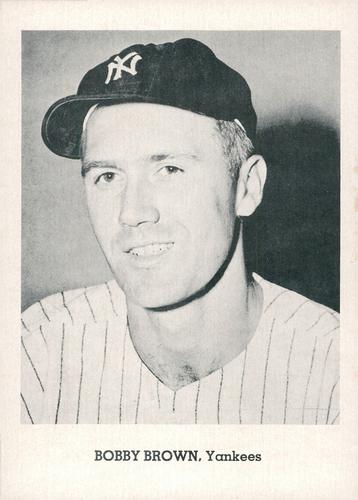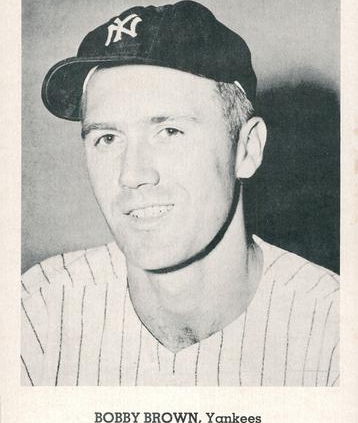October 9, 1949: Yankees ‘dumbfounded that they won it so easily’
 As Dodgers fans streamed through Ebbets Field’s turnstiles on October 9, 1949, their mood matched the day’s weather: warm and sunny. “You could not have a finer day for a baseball game,” broadcaster Red Barber said as World Series Game Five began.1
As Dodgers fans streamed through Ebbets Field’s turnstiles on October 9, 1949, their mood matched the day’s weather: warm and sunny. “You could not have a finer day for a baseball game,” broadcaster Red Barber said as World Series Game Five began.1
Brooklynites were optimistic that their team of young sluggers, led by Jackie Robinson, could rebound from the 3-games-to-1 deficit it faced in the fall classic. But almost immediately, the Yankees stormed to a 5-0 lead that effectively ended the game and the season. “A dramatic World Series, which had moved along with the ponderous and measured pace of a Greek tragedy, wound up at Ebbets Field yesterday like a slap-stick comedy,” Arthur Daley quipped in the New York Times.2
The Dodgers’ problems began with the controversial decision to start Rex Barney, a wild 24-year-old fireballer, instead of staff ace Preacher Roe, who had twirled a six-hit shutout in Game Two four days earlier. Barney hadn’t pitched since the regular-season finale seven days earlier, when he was shelled by the Phillies. According to Barber, Barney hadn’t thrown so much as a warm-up pitch during the interim. “Manager [Burt] Shotton … had a little talk with Preacher Roe,” Barber said on the air before the game, “and Roe said no, he didn’t think he had enough rest. Roe, during the regular season, never pitched with less than five days’ rest, sometimes seven.3 He’s quite slender of physique and quite frail.”4
Before the game Ebbets Field was its usual festive self, with organist Gladys Gooding singing the national anthem while accompanying herself on her instrument. The Dodger Sym-Phony Band also showed off its famously dubious musicianship, much to the crowd’s delight.5 “To say Ebbets Field was crowded would indeed be putting it mildly,” the Brooklyn Daily Eagle noted. “They were standing three-deep all around the lower stands, with all runways and aisles of both tiers, offering any form of vantage point, thoroughly occupied.”6
The Yankees got off to a quick start in the first inning thanks to a botched play by Brooklyn. Trying to field Barney’s wild pickoff throw, shortstop Pee Wee Reese collided with umpire Art Passarella, with the ball glancing off Reese’s glove into center field. Joe DiMaggio then clobbered a long drive that Duke Snider snagged with a spectacular leaping catch, crashing into the center-field wall at the 399-foot marker. DiMaggio’s long fly, followed by a Bobby Brown single up the middle, gave the Yankees a 2-0 lead before the Dodgers even came to bat.
Brooklyn’s undoing came early – in the top of the third. Barney began the frame promisingly, retiring Yogi Berra and DiMaggio before his command unraveled completely. “Barney walked everybody in the ball park with the exception of Gov. Thomas E. Dewey,” the Eagle’s Harold Burr snarked.7 After issuing his fifth and sixth walks of the game, Barney gave up a sharp two-run single to Jerry Coleman, then he was mercifully removed. New York led 5-0 by the time the dust settled, and although the game still had 6½ innings to go, the outcome was never in doubt from then on.
A nice moment for Yankees fans came in the fourth, when DiMaggio batted for the third time. On each of his previous two trips, he’d been robbed in spectacular fashion by Duke Snider – a leaping catch at the wall in the first, and a sprawling grab of a sinking liner in the third. For the Yankee Clipper, it had been a forgettable game, a forgettable World Series (he was 1-for-16 so far), and a forgettable 1949 season. He’d missed the first half of the year with bone spurs in his heel, and as October approached, he contracted a mysterious wasting illness that caused him to lose 18 pounds.8 Many speculated that his retirement was imminent. “He hung on through the series when he hardly had the strength to get the bat around,” the Eagle noted. “The question now is whether Joe can come back. The Clipper has been coming apart at the seams too often of late.”9
DiMaggio had looked better on this day, albeit making two loud outs. Now, on his third try, he launched a blast so far that even Snider couldn’t catch it, sending the ball deep into the left-field stands for his first homer since September 10. The round-tripper provided the weary DiMaggio with some much-needed catharsis. “No home run I’ve ever hit has given me more satisfaction,” he said afterward.10
That made the score 6-1, and the game became a laugher in the sixth, when New York plated four more runs to lead 10-1. The Dodgers made a cursory comeback attempt in the seventh, when Gil Hodges launched a three-run homer off tiring Yankees starter Vic Raschi – but the rally was quelled when New York summoned ace reliever Joe Page, who recorded the final seven outs with little difficulty. The performance gave Page nine innings pitched against Brooklyn with only two earned runs, and he was widely hailed as the hero of the Series – though Allie Reynolds pitched much better.
Before the Yankees were crowned champions, there was one more historic moment in store. It had been an unusually long game, and the sky was starting to darken by the top of the ninth. Commissioner Happy Chandler summoned umpires Cal Hubbard and Beans Reardon (who was working the final game of his career) and ordered them to have the ballpark’s lights turned on. For the first time in history, a World Series game was played under electric lights. (The first scheduled night game in a World Series wouldn’t take place until 22 years later, in 1971.) “But the additional illumination, which cast an eerie light in the autumn dusk, was scarcely needed to reveal the disparity between the two teams,” John Drebinger remarked in the New York Times.11
After Hodges struck out to end the game, the Yankees commenced their celebration in the cramped visitors’ clubhouse. Players whooped, hollered, and shotgunned beer. DiMaggio embraced his 8-year-old son, Joe Jr. And Charlie Keller, the veteran slugger who’d played the final game of his Yankee career a week earlier before missing the entire Series with a back injury, simply sat quietly in a corner and munched on a sandwich.12
Much of the credit for the victory was heaped on New York’s new manager, Casey Stengel – a surprise hire before the season started – who had never won more than 77 games in nine previous major-league seasons. The New York Times described Stengel, 60, as a “wit and philosopher and regarded by many up to this year as mostly clown.”13 Now he became the toast of the Big Apple for winning a championship with what one writer called “a misfit club … a never-say-die bunch of guys who made up in spirit and aggressiveness what they lacked in talent.”14 It took some chutzpah to describe the Yankees, of all teams, as scrappy underdogs, but that was how the press framed the story. Even Shotton, Brooklyn’s manager, agreed. “Not even The Lord could have gotten more out of the Yankees than Casey Stengel,” he said.15
Dodgers fans, meanwhile, licked their wounds, waited for next year, and complained bitterly that Shotton had left Rex Barney in the game too long. Brooklyn’s players appeared shell-shocked. “They really knocked us down and stepped on us,” Jackie Robinson admitted. “I still don’t see how a team like ours could have been licked by a team like that.”16 Echoed infielder Spider Jorgensen: “I thought we were going to bowl over the Yankees, but we didn’t hit. … Rather than being disappointed that the Yankees won the Series, I was dumbfounded that they had won it so easily.”17
SOURCES
In addition to the sources cited in the Notes, the author accessed Retrosheet.org, Baseball-Reference.com, and SABR.org.
NOTES
1 Red Barber, Radio Broadcast of 1949 World Series Game 5. Published on YouTube channel “Classic Baseball on the Radio,” https://youtu.be/JHCQ6Ol09UQ.
2 Arthur Daley, “Champions of the World,” New York Times, October 10, 1949: 28.
3 While the gist of Barber’s statement is accurate, Roe in 1949 actually did start five games on three days’ rest or less.
4 Red Barber, Radio Broadcast of 1949 World Series Game 5.
5 Red Barber, Radio Broadcast of 1949 World Series Game 5.
6 Bert Hochman, “That Old Bromide’s Here Again as Flock Gets 6 to Yankees’ 10,” Brooklyn Daily Eagle, October 10, 1949: 3.
7 Harold C. Burr, “Shotton Admits Yanks Are Better Club,” Brooklyn Daily Eagle, October 10, 1949: 11.
8 John Drebinger, “Yanks Win Series, Beating Dodgers in Fifth Game, 10-6,” New York Times, October, 10, 1949: 27.
9 “DiMaggio Calls Homer in Finale His Best,” Brooklyn Daily Eagle, October 10, 1949: 12.
10 “DiMaggio Calls Homer in Finale His Best.”
11 Drebinger.
12 James P. Dawson, “Victorious Yanks Overwhelmed by Joyous Fans in Riotous Clubhouse Scene,” New York Times, October 10, 1949: 27.
13 Drebinger.
14 Leo H. Peterson, “Stengel Man of Hour in Yankee Conquest,” Brooklyn Daily Eagle, October 10, 1949: 11.
15 Burr.
16 Roscoe McGowen, “Shotton Looks Ahead to Next Year and Series Triumph for Dodgers,” New York Times, October 10, 1949: 28.
17 Danny Peary, We Played the Game (New York: Hyperion, 1994), 110.
Additional Stats
New York Yankees 10
Brooklyn Dodgers 6
Game 5, WS
Ebbets Field
Brooklyn, NY
Box Score + PBP:
Corrections? Additions?
If you can help us improve this game story, contact us.


